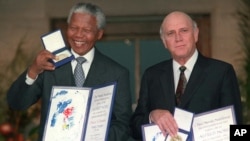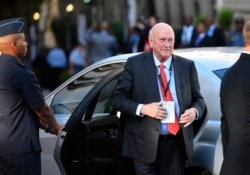The late F.W. de Klerk, South Africa’s final apartheid president, leaves a legacy as complicated as the nation he once led.
Some South Africans say de Klerk, who died last week, deserves to be honored as one of the world’s great statesmen for releasing Nelson Mandela and helping South Africa toward democracy.
Others, though, are focusing on de Klerk’s support of whites-only rule for most of his political career and for the alleged role he played in the murderous rampage of anti-apartheid activists.
“F.W. de Klerk, knowing him also on a personal level for many years now, he’s very misunderstood," said Jan Bosman, the director of the Afrikanerbond, a group representing Afrikaner interests. "Some very unfair remarks are made towards him. And I think it’s unfair at this stage, also in the time of death, to be so harsh and so critical."
Elected president in 1989, de Klerk released African National Congress leader and anti-apartheid icon Mandela from prison in 1990, setting off South Africa’s path to its first democratic, multiracial elections. Four years later, de Klerk’s National Party lost to the ANC, which has held power ever since.
After that, de Klerk was a visible figure amid national reconciliation efforts and fierce debate over whether the pain of segregationist rule could ever be erased.
Political critics and activists say he never went far enough to condemn the brutal acts committed under the whites-only rule. Activists say it is unlikely that former officials during apartheid will ever face justice.
In the 1980s, as South Africa experienced one of the most violent periods in its history, the government, in which de Klerk was a senior member, imprisoned thousands of people. Its forces killed scores of anti-apartheid activists, including four from the small town of Cradock in Eastern Cape province.
“They were driving back from Port Elizabeth to Cradock when they were ambushed, and they were killed,” said Lukhanyo Calata, the son of Fort Calata, one of the four killed.
For much of the 1980s, de Klerk was a member of the government’s State Security Council. SSC documents show that in the months leading up to the killings of the “Cradock Four,” the council discussed the activists’ “permanent removal from society.” Minutes of the meetings indicate that de Klerk was present.
“We wanted de Klerk to confirm what he’d said in those meetings," Calata said. "We wanted him to tell us the truth about what his role was in the planning and conspiracy to murder the Cradock Four. He knew that a crime would be committed and yet he never did anything to stop it.”
Six former police officers later confessed to abducting and executing the Cradock Four, burning the bodies and dumping them in bush near Port Elizabeth. De Klerk denied any knowledge of political assassinations, blaming them on “rogue low-level operatives” within apartheid-era security forces.
Earlier this year, de Klerk claimed that senior ANC leaders “made deals” with his government to prevent prosecutions of apartheid-era politicians and killers. The ANC denies such deals were made.
“The ANC must be rejoicing today because their secret about who it was that entered into those deals with apartheid operatives, de Klerk took that information with him to the grave,” Calata said.
De Klerk repeatedly acknowledged that while he was in favor of apartheid in his “younger years” and a staunch supporter of whites-only rule, he eventually grew to regret his position.
“Since the early 80s, my views changed completely,” de Klerk said in a taped message shortly before his death. “It was as if I had a conversion. And in my heart of hearts, realized that apartheid was wrong. I realized that we had arrived at a place that was morally unjustifiable.”
South African President Cyril Ramaposa, the leader of the ANC, said de Klerk should mostly be judged for leading the country out of apartheid.
“We are saddened because he did play a key role in ushering in democracy in our country,” Ramaphosa said in a statement. “He had the courage to step away from the path that his party, that he led, had embarked upon from 1948, and we will remember him for that.”
De Klerk’s foundation said his funeral on Saturday would be private, attended by family and close friends.





